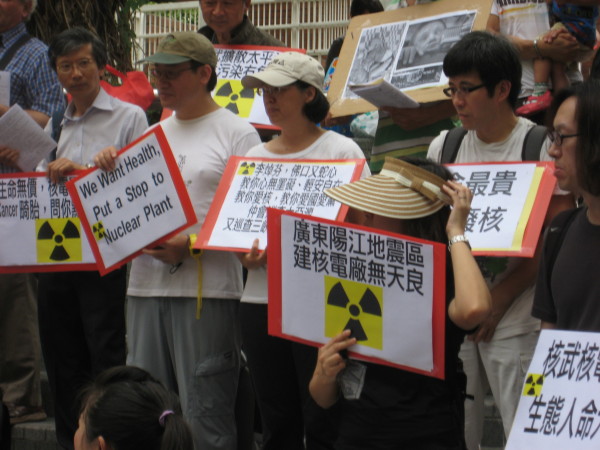In an article titled “Call for the nuclear truth” published in the Hong Kong Standard October 21, 2013, writer Qi Luo began with: “Nuclear power is neither efficient nor clean – and an alliance wants textbooks to get this message through. The Hong Kong Alliance against Nukes said yesterday nuclear electronics* is the opposite of what’s written in textbooks.”
The writer continues with a quote by Ip Chu Ching, a member of the Hong Kong Society for the Study of Nuclear Radiation [Hong Kong], who in turn is reported as saying, such power generation involves processes that rely on fossil fuel and includes uranium mining, extracting enriched uranium, building nuclear power plants, and transporting and burying nuclear waste. Most of these processes consume large amounts of fossil energy, produce lots of greenhouse gas and pollute the water, soil, and air with radioactive and poisonous materials.
Alliance member, Chan Kwong-yue, adds that the efficiency of thermoelectric conversion in nuclear power plants is not high, thus the net energy ratio – that between production and investment – of nuclear electronics is low. In short, nuclear electronics is a complicated, expensive, and high- risk water-boiling way of producing electricity.
Qi Luo points out that the alliance is saying textbooks and teachers have became the propaganda tools for nuclear electronics groups without knowing it. This following studies by the alliance members that found misleading information on nuclear electronics in more than 20 textbooks in Hong Kong, especially the editions meant for teachers.
According to Chan Sze-chi, a professor at Hong Kong Baptist University, this has been a scientific scam since World War II with plants being built even though nuclear power is dirty and inefficient.
The article concludes that teachers should re-evaluate the chapters on nuclear electronics and discuss the subject with students critically, as the Alliance urges. And, publishers should correct the mistakes and offer relevant materials to students and teachers before that.
*Nuclear electronics is a sub-field of electronics concerned with the design and use of high-speed electronic systems for nuclear physics and elementary particle physics research, and for industrial and medical use.
Essential elements of such systems include fast detectors for charged particles, discriminators for separating them by energy, counters for counting the pulses produced by individual particles, fast logic circuits (including coincidence and veto gates), for identification of particular types of complex particle events, and pulse height analyzers (PHAs) for sorting and counting gamma rays or particle interactions by energy, for spectral analysis. (Wikipedia)






